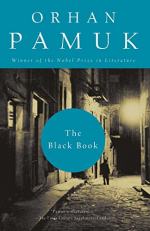|
This section contains 7,523 words (approx. 26 pages at 300 words per page) |

|
SOURCE: Almond, Ian. “Islam, Melancholy, and Sad, Concrete Minarets: The Futility of Narratives in Orhan Pamuk's The Black Book.” New Literary History 34, no. 1 (winter 2003): 75-90.
In the following essay, Almond discusses how Pamuk blends themes of sadness and “the anxiety of identity” in The Black Book.
Instead of being amazed that library shelves in Islamic countries are crammed full of handwritten interpretations and commentaries, all one has to do is take a look at the multitudes of broken men in the street to know why.1
All the books of Orhan Pamuk, in their own way, breathe certain sadnesses. Their plots are wandering and discursive, their tones reflective yet distant, their styles making curious use of an oxymoronically comic melancholy. The settings of his books seem to underline this tristesse which clings to every line of Pamuk's prose: the gentle despair and nostalgia of the Venetian prisoner in The...
|
This section contains 7,523 words (approx. 26 pages at 300 words per page) |

|


